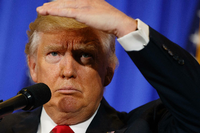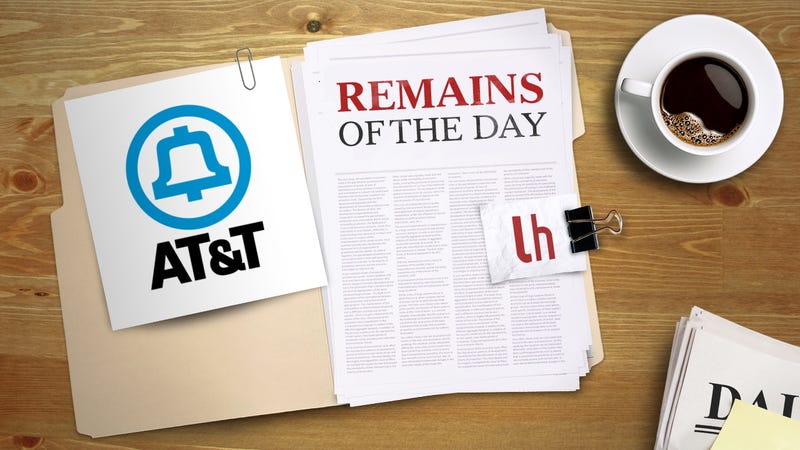 Als Donald Trump am Mittwoch auf einer mit zehn amerikanischen Fahnen geschmückten Bühne im Trump Tower von New York vor die Presse tritt , wirkt er angespannt und zum Kampf bereit. Zum Kampf gegen die Geheimdienste und gegen einen Teil der Medien in Washington – und nicht so sehr zur Auseinandersetzung mit Russland. Gut eine Woche vor seiner Amtseinführung als neuer US-Präsident ist er durch neue Vorwürfe unter Druck geraten.
Als Donald Trump am Mittwoch auf einer mit zehn amerikanischen Fahnen geschmückten Bühne im Trump Tower von New York vor die Presse tritt , wirkt er angespannt und zum Kampf bereit. Zum Kampf gegen die Geheimdienste und gegen einen Teil der Medien in Washington – und nicht so sehr zur Auseinandersetzung mit Russland. Gut eine Woche vor seiner Amtseinführung als neuer US-Präsident ist er durch neue Vorwürfe unter Druck geraten.
Teilweise lesen sich die neuen Vorwürfe wie Episoden aus einem billigen Spionageroman, in dem ein Staat einen Politiker eines anderen Landes mit Informationen über Sex, Geld und Korruption unter Druck setzt. Zusammengetragen wurden die Berichte von einem bei einer privaten Detektei angestellten britischen Ex-Agenten, der zuerst im Auftrag von Trumps innerparteilichen Konkurrenten bei den Republikanern und dann für die Demokraten belastendes Material über den Milliardär und Präsidentschaftskandidaten sammelte.
Dabei kam laut den Medienberichten zutage, dass Russland über kompromittierende Informationen zu Trump verfügt. Dazu gehören angeblich Sex-Videos aus einem Moskauer Hotel, die Trump mit Prostituierten zeigen.
Der designierte Präsident weist dies mit der Bemerkung zurück, er sei sich bei Auslandsreisen über eine etwaige Überwachung bewusst und verhalte sich vorsichtig – außerdem habe er eine „Bakterien-Phobie“, sagt er mit Blick auf sein angebliches Rendezvous mit Moskauer Prostituierten. Trump dementiert auch einen Bericht, wonach seine Mitarbeiter mit russischen Regierungsvertretern über die Hackerangriffe auf Hillary Clintons Demokraten gesprochen haben. Würde dieser Bericht der Wahrheit entsprechen, stünde der Vorwurf des Landesverrats im Raum.
Trump erneuert vielmehr seine Kritik an den Geheimdiensten. Die neuen Berichte über Russland seien „Nonsens“. Sollte sich herausstellen, dass die Geheimdienste hinter den Veröffentlichungen steckten, wäre das ein schwarzer Fleck auf den Diensten. „Es ist eine Schande. Nazi-Deutschland hat sowas gemacht.“ An anderer Stelle sagt er in Anspielung auf die Geheimdienste, die USA seien wehrlos gegen Hackerangriffe aus dem Ausland, weil auf der US-Seite Leute am Werk seien, „die keine Ahnung haben“. Die USA seien das Ziel russischer Hackerangriffe gewesen, gibt er zu – eine Stellungnahme, die er bisher vermieden hat. Aber auch China sei auf diesem Gebiet aktiv, schiebt er schnell nach.
Scharfe Kritik an Russland und Präsident Wladimir Putin kommt Trump nach wie vor nicht über die Lippen. Er „respektiere“ das russische Dementi nach den neuesten Berichten, sagt er. Wenn Putin ihn möge, sei das gut für die USA, nicht schlecht. „Russland wird mehr Respekt vor uns haben.“ Erpressbar sei er nicht, sagt Trump.
Beim Streit um potenzielle Interessenkonflikte als erfolgreicher Geschäftsmann im Weißen Haus geht er zum Gegenangriff über. Seine Söhne Donald und Eric würden sein Unternehmen Trump Organization in „völliger Kontrolle“ übernehmen. Er bittet seine Anwältin Sheri Dillon auf die Bühne, die den Journalisten erläutert, wie Trump sein Vermögen in einen Fonds stecken wird, auf den er keinen Zugriff habe und der streng nach den bestehenden Regularien verwaltet werden solle. Es werde eine „Mauer“ zwischen dem Präsidialamt und der Trump Organization geben, sagt Dillon. Einnahmen aus dem Ausland für die Trump-Hotels werde der neue Präsident der amerikanischen Staatskasse spenden.
Er geht zu Beginn seiner Pressekonferenz schnell zum Eigenlob über. Amerikanische Firmen seien schon jetzt dabei, Arbeitsplätze und Investitionen aus dem Ausland wieder in die USA zu bringen. „Ich werde der größte Job-Produzent sein, den Gott je geschaffen hat“, sagt er. Erneut verspricht er den raschen Bau einer Mauer an der Grenze zu Mexiko sowie eine zügige Abschaffung der Gesundheitsreform seines Vorgängers Barack Obama und hohe Strafzölle für US-Unternehmen, die im Ausland produzierte Waren in den USA verkaufen wollen.
Bereits einige Stunden vor der Pressekonferenz hatte Trump auf Twitter seinem Ärger über die neuen Veröffentlichungen freien Lauf gelassen, die er als Teil einer Verschwörung der Medien und seiner politischen Gegner sieht. Er habe die Wahl vom 8. November klar gewonnen, doch wollten seine „betrügerische“ Rivalen diesen Sieg kleinreden, schreibt er auf Twitter. Von einer „Hexenjagd“ ist die Rede.
Auch bei der Pressekonferenz wettert Trump gegen Medien, die nach seinen Worten „Fake News“ auf den Markt werfen. Einem Reporter des Nachrichtensenders CNN verweigert er mit dem Hinweis auf diese „erfundene Nachrichten“ das Recht, eine Frage zu stellen. CNN weist die Vorwürfe des designierten Präsidenten und seiner Mitarbeiter zurück.
Offenbar wussten etliche Politiker und Journalisten in Washington schon seit Monaten von der Existenz des neu bekannt gewordenen Dossiers. Das Wahlkampfteam von Trumps geschlagener Rivalin Hillary Clinton kritisiert deshalb nun, dass die potenziell explosiven Vorwürfe damals zurückgehalten wurden.
Viele Beobachter bezweifeln die Authentizität der Angaben. „Eine Schande“, sagt Trumps Sprecher Sean Spicer. Vizepräsident Mike Pence spricht von einem „unverantwortlichen“ Verhalten von einem Teil der Medien. Niemand weiß, ob die Informationen zutreffen. Auch die amerikanischen Geheimdienste wissen es nicht. Allerdings nehmen die Chefs der Dienste das Material so ernst, dass sie es für richtig hielten, Trump, Obama und führende Politiker im Kongress vergangene Woche mit einer Zusammenfassung darüber zu informieren. Gleichzeitig hatten die Geheimdienste Donald Trump damals offiziell über die russischen Hackerangriffe auf den US-Wahlkampf informiert, die zu seinen Gunsten gestartet worden sein sollen.
Die meisten amerikanischen Medien berichten zwar über die Tatsache, dass die neuen Vorwürfe aufgetaucht sind, gehen aber nicht inhaltlich auf die einzelnen Episoden wie die mit den Prostituierten ein, weil diese nicht unabhängig zu klären seien. Nur das Internetportal BuzzFeed veröffentlicht das komplette Dossier – und muss sich von Trump vorhalten lassen, gefälschte Nachrichten unters Volk gebracht zu haben.
Schon vor dem Bekanntwerden der neuen Vorwürfe hatte Trump ein schwieriges Verhältnis zu den US-Geheimdiensten. Lange tat er die Berichte über russische Hackerangriffe als lächerlich ab. Laut Medienberichten will er die diversen Dienste nach seinem Amtsantritt einer radikalen Reform unterziehen und viele Stellen streichen. Viele Geheimdienstler betrachten Trump demnach mit Misstrauen – seine aktuellen Ausfälle haben daran gewiss nichts geändert.
© Source: http://www.tagesspiegel.de/politik/donald-trump-reagiert-auf-neue-vorwuerfe-nazi-deutschland-hat-sowas-gemacht/19242234.html
All rights are reserved and belongs to a source media.
 Reader Alec submitted this desktop that brings a little bit of Windows 10 into macOS, but only the good parts. Mission Control gets a lovely unified look, and there’s an app launcher at the bottom that functions like a taskbar. Here’s how it’s all set up.
Reader Alec submitted this desktop that brings a little bit of Windows 10 into macOS, but only the good parts. Mission Control gets a lovely unified look, and there’s an app launcher at the bottom that functions like a taskbar. Here’s how it’s all set up. 

 Need a solid graphics card upgrade? We have just the thing. Newegg is selling MSI’s Radeon RX 480 Armor 4G OC graphics card for just $184.99 , making it the cheapest RX 480 4GB card on the site right now. A $25 mail-in rebate could bring that price tag into RX 470 territory, too.
Need a solid graphics card upgrade? We have just the thing. Newegg is selling MSI’s Radeon RX 480 Armor 4G OC graphics card for just $184.99 , making it the cheapest RX 480 4GB card on the site right now. A $25 mail-in rebate could bring that price tag into RX 470 territory, too. 
 If you’ve been holding on to your old unlimited data plan with AT&T, you’ll soon be paying a little more. They’re increasing the price $5 to $40 per month, starting in March 2017. That and more in today’s news.
If you’ve been holding on to your old unlimited data plan with AT&T, you’ll soon be paying a little more. They’re increasing the price $5 to $40 per month, starting in March 2017. That and more in today’s news. 
 Depending on how the oats you use were processed, your oatmeal can come out either too chewy or too mushy. For the perfect texture, combine rolled and steel cut oats together.
Depending on how the oats you use were processed, your oatmeal can come out either too chewy or too mushy. For the perfect texture, combine rolled and steel cut oats together. 
 The Federal Communications Commission under Chairman Tom Wheeler has come down hard on zero-rating offers from AT&T and Verizon.
The Federal Communications Commission under Chairman Tom Wheeler has come down hard on zero-rating offers from AT&T and Verizon. 
 «Peaky Blinders,» starring Cillian Murphy, is about to film its new season.
«Peaky Blinders,» starring Cillian Murphy, is about to film its new season. 
 Die Errichtung künstlicher Inseln durch China und die Stationierung militärischer Posten darauf sei vergleichbar mit der Annexion der Krim-Halbinsel durch Russland, sagte Tillerson am Mittwoch in seiner Anhörung vor dem US-Senat.
Die Errichtung künstlicher Inseln durch China und die Stationierung militärischer Posten darauf sei vergleichbar mit der Annexion der Krim-Halbinsel durch Russland, sagte Tillerson am Mittwoch in seiner Anhörung vor dem US-Senat. 
 Als Donald Trump am Mittwoch auf einer mit zehn amerikanischen Fahnen geschmückten Bühne im Trump Tower von New York vor die Presse tritt , wirkt er angespannt und zum Kampf bereit. Zum Kampf gegen die Geheimdienste und gegen einen Teil der Medien in Washington – und nicht so sehr zur Auseinandersetzung mit Russland. Gut eine Woche vor seiner Amtseinführung als neuer US-Präsident ist er durch neue Vorwürfe unter Druck geraten.
Als Donald Trump am Mittwoch auf einer mit zehn amerikanischen Fahnen geschmückten Bühne im Trump Tower von New York vor die Presse tritt , wirkt er angespannt und zum Kampf bereit. Zum Kampf gegen die Geheimdienste und gegen einen Teil der Medien in Washington – und nicht so sehr zur Auseinandersetzung mit Russland. Gut eine Woche vor seiner Amtseinführung als neuer US-Präsident ist er durch neue Vorwürfe unter Druck geraten. 
 Frankreich hat seine Favoritenstellung gleich zum Auftakt der Handball-WM im eigenen Land untermauert. Der Titelverteidiger und Gastgeber setzte sich im Eröffnungsspiel am Mittwochabend deutlich mit 31:16 (17:7) gegen überforderte Brasilianer durch. Mit sechs Treffern war Rechtsaußen Valentin Porte in der ausverkauften Pariser Halle bester Torschütze der Franzosen. Die Superstars Nikola Karabatic und Daniel Narcisse erzielten jeweils drei Treffer für die ambitionierten Gastgeber.
Frankreich hat seine Favoritenstellung gleich zum Auftakt der Handball-WM im eigenen Land untermauert. Der Titelverteidiger und Gastgeber setzte sich im Eröffnungsspiel am Mittwochabend deutlich mit 31:16 (17:7) gegen überforderte Brasilianer durch. Mit sechs Treffern war Rechtsaußen Valentin Porte in der ausverkauften Pariser Halle bester Torschütze der Franzosen. Die Superstars Nikola Karabatic und Daniel Narcisse erzielten jeweils drei Treffer für die ambitionierten Gastgeber. 
 Der künftige US-Präsident hatte bislang Zweifel an der Einschätzung der US-Geheimdienste geäußert, wonach Russland hinter den Angriffen auf Computer der Demokraten stand. Das hat sich nun geändert.
Der künftige US-Präsident hatte bislang Zweifel an der Einschätzung der US-Geheimdienste geäußert, wonach Russland hinter den Angriffen auf Computer der Demokraten stand. Das hat sich nun geändert. 

